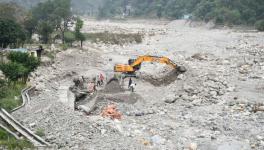Unprecedented Heat in Canada, US, a Consequence of Man-Made Climate Change
An unprecedented heat wave struck parts of Canada and the US between June 25 and July 1, affecting the likes of Portland, Oregon, Seattle and Washington in the US and Vancouver in Canada, cities that rarely experience such heat. The western Canadian province of British Columbia was one of the worst affected, reportedly registering more than 500 excess deaths and over 180 wildfires as a result of the extreme heat events.
This region’s peak temperature was recorded at 49.6 degree Celsius on June 29 in the village of Lytton, where the villagers were evacuated before a blaze destroyed it almost entirely.
To ascertain whether man-made climate change was chiefly responsible for the heatwaves, a group of 27 scientists from the World Weather Attribution (WWA) project rushed to the spot.
They concluded that the chance of temperatures reaching as high as 49.6 degrees Celsius in the north-west Pacific region increased 150 fold since the end of the nineteenth century. Their analysis has been made public here.
Sjoukje Philip, a climate scientist from the Royal Netherlands Meteorological Institute (KNMI) and a co-author of the report, was quoted saying: “This heatwave would have been virtually impossible without the influence of human-caused climate change. It was probably still a rare event, but if global warming might exceed two degrees, it might occur every five to ten years in the future.”
The WWA initiative is a collaboration of climate scientists from several universities and institutions – University of Oxford, UK; KNMI, Netherlands; IPSL/LSCE, France; Princeton University and NCAR, US; IIT Delhi, India; ETH Zurich, Switzerland; climate specialists at Red Cross/Red Crescent Climate Centre – from around the world. The collaboration aims to provide a robust assessment of whether an extreme climate event anywhere in the world was a consequence of climate change.
The latest assessment by WWA on the heatwaves in the US and Canada reveals a footprint of man-made climate change. In their analysis, the team compared the daily records of temperature with that of maximum daily temperatures predicted by climate models. This included simulation of temperatures in an environment which is unaltered by a staggering rise in greenhouse gas concentration in the atmosphere. Their assessment led them to infer that the global temperature increased by 1.2 degrees Celsius on an average since the pre-industrial period fuelled the extreme heat conditions to happen, at least by 150 times.
Geert Jan van Oldenborgh, a climate modeler at the KNMI and another co-author of the study, said: “The analysis was more challenging than similar studies, including those on heatwaves in the past few years in western Europe and Russia.”
“The peak temperatures observed were up to 5°C higher than previous records in the region. These extremes made it hard to pin down precisely how rare a heatwave of such strength might have been in cooler periods of the past, and how often it might be expected to occur in the current climate,” Oldeborgh added.
It is also possible that climate change has been causing extreme heat more frequently and intensely, which would not have happened in a cooler climate. If this is true then the regions are more likely to experience extreme heatwaves than those predicted by the climate models, according to Dr. Friederike Otto, a climate researcher at Oxford University and the co-lead of WWA.
“Here’s a strong warning that we have to study heatwaves more. Climate change is an absolute game changer for extreme events and models might not be a good indicator of what might still come in a warming world,” Otto added in a statement.
Get the latest reports & analysis with people's perspective on Protests, movements & deep analytical videos, discussions of the current affairs in your Telegram app. Subscribe to NewsClick's Telegram channel & get Real-Time updates on stories, as they get published on our website.
























